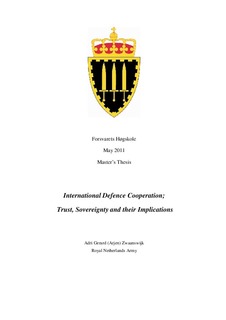International Defence Cooperation: trust, sovereignity and their implications
Master thesis
Permanent lenke
http://hdl.handle.net/11250/100012Utgivelsesdato
2011Metadata
Vis full innførselSamlinger
- Masteroppgaver [466]
Sammendrag
International Defence Cooperation (IDC) is often presented as one of the solutions to the budgetary problems western European states face when maintaining their armed forces. IDC is a defensive strategy, chosen by lack of other options. In reality, IDC is as much a problem as it can be a solution. This thesis investigates if the need to uphold national sovereignty and a lack of international trust are among the factors that hamper states to come to more and closer cooperation and how this mechanism influences international defence cooperation. After a short analysis of the nature of problems in IDC, the role of trust and sovereignty is explored in three different ways. First, nine cases of IDC are investigated by analyzing the treaties, MoU’s and agreements that formalize these multinational initiatives. Secondly, interviews were conducted with officers working at ministerial and defence staff level. Third, theory from the field of international relations was studied to assess if the findings on IDC are in line with theory from other fields of international cooperation. Most West-European states accept the necessity of IDC. However, effective cooperation is not possible without giving up, at least parts of, national influence and sovereignty. Governments are reluctant to do so, since they wish to maintain control over their armed forces. One reason is domestic political accountability for military actions. The second reason is that governments cannot fully trust each other. They can be forced to change earlier decisions on cooperation or be changed themselves. States therefore wish to maintain flexibility and autonomy in their cooperation and avoid dependence on other states. This leads to suboptimal organization of international cooperation and multinational units
